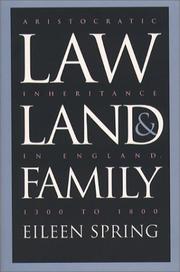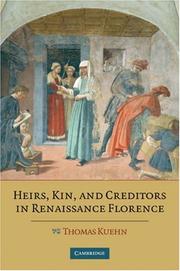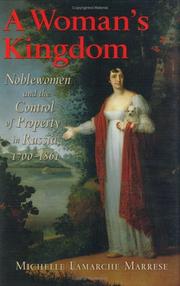| Listing 1 - 10 of 27 | << page >> |
Sort by
|
Book
ISBN: 0748698493 9780748698493 9781845861285 1845861280 Year: 2013 Publisher: Dundee
Abstract | Keywords | Export | Availability | Bookmark
 Loading...
Loading...Choose an application
- Reference Manager
- EndNote
- RefWorks (Direct export to RefWorks)
What happens after you die? You can't take it with you, so succession law governs how your property is passed on after your death. Succession Law Essentials teaches you all you need to know about the Scots laws of succession, including estates, executors, wills, will substitutes, valid and invalid testimony, intestate succession, legacies, vesting and more. Summary sections of Essentials Facts and Essential Cases will help you to identify, understand and remember the key elements, and tables of cases and statutes will help you to find the page you're looking for quickly and easily.
Inheritance and succession --- Bequests --- Descent and distribution --- Descents --- Hereditary succession --- Intestacy --- Intestate succession --- Law of succession --- Succession, Intestate --- Real property --- Universal succession --- Trusts and trustees --- Law and legislation

ISBN: 0807864706 9780807864708 0807821101 9780807821107 0807846422 9780807846421 9798890868664 Year: 1993 Publisher: Chapel Hill, NC : University of North Carolina Press,
Abstract | Keywords | Export | Availability | Bookmark
 Loading...
Loading...Choose an application
- Reference Manager
- EndNote
- RefWorks (Direct export to RefWorks)
Inheritance and succession --- Law - Non-U.S. --- Law, Politics & Government --- Law - Great Britain --- Bequests --- Descent and distribution --- Descents --- Hereditary succession --- Intestacy --- Intestate succession --- Law of succession --- Succession, Intestate --- Real property --- Universal succession --- Trusts and trustees --- History. --- History --- Law and legislation
Book
ISBN: 1623962978 9781623962975 9781623962951 1623962951 9781623962968 162396296X Year: 2013 Publisher: Charlotte, NC Information Age Pub. Inc.
Abstract | Keywords | Export | Availability | Bookmark
 Loading...
Loading...Choose an application
- Reference Manager
- EndNote
- RefWorks (Direct export to RefWorks)
Inheritance and succession. --- Bequests --- Descent and distribution --- Descents --- Hereditary succession --- Inheritance and succession --- Intestacy --- Intestate succession --- Law of succession --- Succession, Intestate --- Real property --- Universal succession --- Trusts and trustees --- Law and legislation
Book
ISBN: 0804771081 9780804771085 9780804760362 9780804762090 0804760365 0804762090 Year: 2009 Publisher: Stanford, Calif. Stanford Law Books
Abstract | Keywords | Export | Availability | Bookmark
 Loading...
Loading...Choose an application
- Reference Manager
- EndNote
- RefWorks (Direct export to RefWorks)
The law of succession rests on a single brute fact: you can't take it with you. The stock of wealth that turns over as people die is staggeringly large. In the United States alone, some
Inheritance and succession --- Bequests --- Descent and distribution --- Descents --- Hereditary succession --- Intestacy --- Intestate succession --- Law of succession --- Succession, Intestate --- Real property --- Universal succession --- Trusts and trustees --- History. --- Social aspects --- Law and legislation

ISBN: 1107185270 0511386265 9786611254971 0511382626 0511384432 0511387296 0511388284 1281254975 0511511809 0511380453 9780511388286 9780511387296 0521882346 9780521882347 0511381565 0521178479 9780511511806 9780521178471 Year: 2007 Publisher: Cambridge [etc.] Cambridge University Press
Abstract | Keywords | Export | Availability | Bookmark
 Loading...
Loading...Choose an application
- Reference Manager
- EndNote
- RefWorks (Direct export to RefWorks)
This study, based on Florentine repudiations of inheritance, reveals that inheritance was not simply an automatic process where the recipients were passive, if grateful. In influential European societies of the past, it was in fact a process that continued long after the deceased's death. Heirs also had options: at the least, to reject a burdensome patrimony, but also to manoeuvre property to others and to avoid (at times deceptively, if not fraudulently) the claims of others to portions of the estate. Repudiation was a vestige of Roman law that once again became a viable legal institution with the revival of Roman law in the Middle Ages. Florentines incorporated repudiation into their strategies of adjustment after death, showing that they were not merely passive recipients of what came their way. Further, these strategies fostered family goals, including continuity across the generations.
Inheritance and succession --- Renunciation of inheritance --- Renunciation (Law) --- Bequests --- Descent and distribution --- Descents --- Hereditary succession --- Intestacy --- Intestate succession --- Law of succession --- Succession, Intestate --- Real property --- Universal succession --- Trusts and trustees --- History. --- Law and legislation --- Florence (Italy) --- History --- Arts and Humanities

ISBN: 0801439116 1501728512 Year: 2002 Publisher: Ithaca (N.Y.) Cornell University Press
Abstract | Keywords | Export | Availability | Bookmark
 Loading...
Loading...Choose an application
- Reference Manager
- EndNote
- RefWorks (Direct export to RefWorks)
In A Woman's Kingdom, Michelle Lamarche Marrese explores the development of Russian noblewomen's unusual property rights. In contrast to women in Western Europe, who could not control their assets during marriage until the second half of the nineteenth century, married women in Russia enjoyed the right to alienate and manage their fortunes beginning in 1753. Marrese traces the extension of noblewomen's right to property and places this story in the broader context of the evolution of private property in Russia before the Great Reforms of the 1860s. Historians have often dismissed women's property rights as meaningless. In the patriarchal society of Imperial Russia, a married woman could neither work nor travel without her husband's permission, and divorce was all but unattainable. Yet, through a detailed analysis of women's property rights from the Petrine era through the abolition of serfdom in 1861, Marrese demonstrates the significance of noblewomen's proprietary power. She concludes that Russian noblewomen were unique not only for the range of property rights available to them, but also for the active exercise of their legal prerogatives.A remarkably broad source base provides a solid foundation for Marrese's conclusions. These sources comprise more than eight thousand transactions from notarial records documenting a variety of property transfers, property disputes brought to the Senate, noble family papers, and a vast memoir literature. A Woman's Kingdom stands as a masterful challenge to the existing, androcentric view of noble society in Russia before Emancipation.
Women --- Inheritance and succession --- Women landowners --- Landowners --- Bequests --- Descent and distribution --- Descents --- Hereditary succession --- Intestacy --- Intestate succession --- Law of succession --- Succession, Intestate --- Real property --- Universal succession --- Trusts and trustees --- History. --- Law and legislation
Book
ISBN: 0674283198 0674062639 9780674062634 9780674046887 0674046889 Year: 2012 Publisher: Cambridge, MA
Abstract | Keywords | Export | Availability | Bookmark
 Loading...
Loading...Choose an application
- Reference Manager
- EndNote
- RefWorks (Direct export to RefWorks)
We all hope that we will be cared for as we age. But the details of that care, for caretaker and recipient alike, raise some of life's most vexing questions. From the mid-nineteenth to the mid-twentieth century, as an explosive economy and shifting social opportunities drew the young away from home, the elderly used promises of inheritance to keep children at their side. Hendrik Hartog tells the riveting, heartbreaking stories of how families fought over the work of care and its compensation.Someday All This Will Be Yours narrates the legal and emotional strategies mobilized by older people, and explores the ambivalences of family members as they struggled with expectations of love and duty. Court cases offer an extraordinary glimpse of the mundane, painful, and intimate predicaments of family life. They reveal what it meant to be old without the pensions, Social Security, and nursing homes that now do much of the work of serving the elderly. From demented grandparents to fickle fathers, from litigious sons to grateful daughters, Hartog guides us into a world of disputed promises and broken hearts, and helps us feel the terrible tangle of love and commitments and money.From one of the bedrocks of the human condition-the tension between the infirmities of the elderly and the longings of the young-emerges a pioneering work of exploration into the darker recesses of family life. Ultimately, Hartog forces us to reflect on what we owe and are owed as members of a family.
Inheritance and succession --- Older people --- Aged --- Aging people --- Elderly people --- Old people --- Older adults --- Older persons --- Senior citizens --- Seniors (Older people) --- Age groups --- Persons --- Gerontocracy --- Gerontology --- Old age --- Bequests --- Descent and distribution --- Descents --- Hereditary succession --- Intestacy --- Intestate succession --- Law of succession --- Succession, Intestate --- Real property --- Universal succession --- Trusts and trustees --- History. --- Care --- Law and legislation
Book
ISBN: 1351922645 1315250632 1283148919 9786613148919 0754698645 9780754698647 9781409400141 140940014X 113826055X Year: 2010 Publisher: Burlington, Vt. : Ashgate,
Abstract | Keywords | Export | Availability | Bookmark
 Loading...
Loading...Choose an application
- Reference Manager
- EndNote
- RefWorks (Direct export to RefWorks)
Focusing on the rhetoric of the last will and testament, Cathrine O. Frank examines novels alongside actual wills, legal manuals, case law, and contemporary accounts of wills in periodicals. Her analysis of works by such authors as Emily Brontë, Charles Dickens, Wilkie Collins, and John Galsworthy shows how these related discourses competed to structure a social order based on the self-determining individual's relationship to a community and its commodified culture.
English fiction --- Law and literature --- Wills --- Wills in literature. --- Inheritance and succession in literature. --- Inheritance and succession --- Bequests --- Descent and distribution --- Descents --- Hereditary succession --- Intestacy --- Intestate succession --- Law of succession --- Succession, Intestate --- Real property --- Universal succession --- Trusts and trustees --- Codicils --- Legal instruments --- Registers of births, etc. --- Legacies --- Probate records --- Remainders (Estates) --- Literature and law --- Literature --- History and criticism. --- History. --- Law and legislation
Book
ISBN: 1107241766 1139889737 1107251273 1139564994 1107247950 1107250447 1107248787 1107249619 9781139564991 9781107250444 9781107247956 9781107248786 9781107035508 1107035503 1299841767 9781107241763 9781139889735 9781107251274 9781107249615 Year: 2013 Publisher: Cambridge : Cambridge University Press,
Abstract | Keywords | Export | Availability | Bookmark
 Loading...
Loading...Choose an application
- Reference Manager
- EndNote
- RefWorks (Direct export to RefWorks)
Yvonne Pitts explores inheritance practices by focusing on nineteenth-century testamentary capacity trials in Kentucky in which disinherited family members challenged relatives' wills. These disappointed heirs claimed that their departed relative lacked the capacity required to write a valid will. These inheritance disputes criss-crossed a variety of legal and cultural terrains, including ordinary people's understandings of what constituted insanity and justice, medical experts' attempts to infuse law with science, and the independence claims of women. Pitts uncovers the contradictions in the body of law that explicitly protected free will while simultaneously reinforcing the primacy of blood in mediating claims to inherited property. By anchoring the study in local communities and the texts of elite jurists, Pitts demonstrates that 'capacity' was a term laden with legal meaning and competing communal values about family, race relations and rationality. These concepts evolved as Kentucky transitioned from a conflicted border state with slaves to a developing free-labor, industrializing economy.
Inheritance and succession --- Wills --- Codicils --- Legal instruments --- Registers of births, etc. --- Legacies --- Probate records --- Remainders (Estates) --- Bequests --- Descent and distribution --- Descents --- Hereditary succession --- Intestacy --- Intestate succession --- Law of succession --- Succession, Intestate --- Real property --- Universal succession --- Trusts and trustees --- Law and legislation --- Arts and Humanities --- History
Book
ISBN: 9004461442 9004448160 9789004448162 Year: 2021 Publisher: Leiden, The Netherlands : Brill,
Abstract | Keywords | Export | Availability | Bookmark
 Loading...
Loading...Choose an application
- Reference Manager
- EndNote
- RefWorks (Direct export to RefWorks)
This volume offers the first comprehensive analysis of wills in late medieval Krakow. It presents the origins of testamentary acts in the Kingdom of Poland and its centre, Krakow, and their subsequent transformation from so called ‘canonical wills’ to ‘communal wills’. Wysmułek discusses the socio-cultural role of wills and sets them in their contemporary legal, social, and economic context. In doing so, he uncovers their influence on property ownership and family relations in the city, as well as on the religious practices of the burghers. Ultimately, this work seeks to change the perception of wills by treating the testamentary act itself as an important agent of historical social change – a ‘tool of power’. Readership: Urban historians of the late medieval period interested in the socio-cultural development of law, and anyone interested in medieval documentary history.
Wills --- Inheritance and succession --- History --- Social aspects --- Bequests --- Descent and distribution --- Descents --- Hereditary succession --- Intestacy --- Intestate succession --- Law of succession --- Succession, Intestate --- Real property --- Universal succession --- Trusts and trustees --- Codicils --- Legal instruments --- Registers of births, etc. --- Legacies --- Probate records --- Remainders (Estates) --- Law and legislation --- General & world history --- General and world history
| Listing 1 - 10 of 27 | << page >> |
Sort by
|

 Search
Search Feedback
Feedback About UniCat
About UniCat  Help
Help News
News